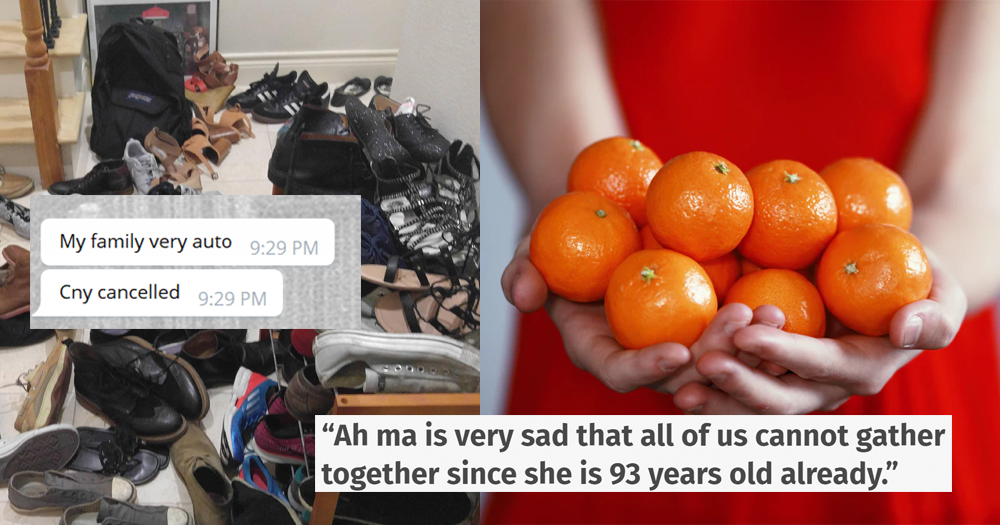PERSPECTIVE: From Jan. 26 onwards, safe management restrictions only allow Singapore homes to entertain up to eight visitors per day. Chinese New Year (CNY) visitations have become a logistical headache for some, especially those with large families.
In the week leading up to CNY, we talk to a few Singaporeans to find out how their families have been affected by the measures, and their thoughts on the whole situation.
How do you know it's CNY? Perhaps it's when a throng of relatives you hardly see suddenly gather to exchange greetings, niceties and angpows.
For me, it's when my entire extended family of over 30 people gathers at my grandmother's place on the first day of CNY.
It's like a typical family gathering filled with lots of food and laughter.
The only difference? We're better-dressed.
But CNY in the midst of a pandemic, however, is looking to be slightly different. Peculiar even.
With households only able to accept eight visitors per day, the biggest question is: How will families organise themselves?
Of course, it could very well be that a family just decides to cancel CNY and scrap all visitation plans.
Me to a friend: "Hey, how is your family going to celebrate CNY this year ah?"
Friend:
Which is perfectly fine.
But for most families, mine included, my guess is that they will still try to ensure that some form of visiting still takes place.
With over 30 people and only eight allowed per day, some will not get to visit during the first weekend
When the announcement on the eight-visitor rule first happened, there was a bit of a scramble in my family's WhatsApp chat.
And understandably so, since the implication of the policy meant that not every family would get to visit our grandmother during the first (or even second) day of CNY. My dad has seven siblings, and the majority of which have their own families of one to three kids. Some of these "kids" have also gone on to have their own kids.
Basically, CNY this year would look vastly different from the CNY celebrations we've known all our lives and the restrictions would require us to do a bit of organising amongst ourselves.
We're not alone as well.
Tang Mei Yong, 50, told Mothership that their usual family gatherings involve a much smaller crowd of less than 30. But CNY is a slightly different, with over 50 relatives, including those they only see once a year, "(squeezing) together".
55-year-old Amy Cheong also told us that there would be around 50 to 60 people "crammed into ah ma's house" on the first day of CNY.
But due to the virus, Cheong explained: "If they are uncomfortable with it, because there are still risks, they can choose not to come to visit at all and we will respect their decision."
Who does all the coordinating? Is anybody even doing it?
The next logical step is to organise those who wish to visit anyway. But who is to be entrusted with the laborious task of coordinating different families?
The most fuss-free method for my family is to make use of an existing WhatsApp chat group so everyone can add on to a running list of who visits when.
More importantly, the chat allows everyone to coordinate requests in real-time. ("Sorry, ah ma requesting mahjong kaki (friends) for day 1 so can non-mahjong players swap to another date?").
An illustrative example of a proposed list involving who to visit when, with the number of visitors helpfully indicated in parentheses:

(Translation: Day 1: Eldest Brother, Second eldest brother; Day 2: Third brother, fifth brother; Day 3: Eldest Sister)
There could be other practical factors influencing who coordinates the entire timetable too. In the case of Cheong, for instance, her sister helps to coordinate since she lives with their mum.
But for other families without similar chat groups, this role might simply fall onto the lap of the most organised person in the family, simply by virtue of the fact that this individual is just naturally better at keeping track of things and chasing others for a response.
How to decide which family visits when?
The next order of business is to arrange who gets to visit when.
Which is potentially a real headache when you need to think about the capacity limits, and to also factor in the schedules of multiple families.
It could be on a first-come first-serve basis. Like Tang's family, where whoever calls to lock in their timeslot will get to visit first.
But other families have other considerations.
The daughters on my dad's side of the family were quick to decide on behalf of everyone: "Let the sons visit first".
Which makes sense when you consider how daughters are traditionally considered 'outsiders' once they get married. After marriage, the daughter would prioritise her husband's family.
For Cheong's family, they decided to use age as an organising principle instead, where the families of the older siblings get to visit their mum first.
How does Cheong feel, not being able to visit her family during the first week (she will be visiting on the following week instead as she is the youngest sibling)?
"No one is cut out intentionally," she told us. "It's a mutual decision among the siblings."
She also added, with profound reflectiveness:
"The days don't matter. Because we can visit them other days too. If we only visit our parents or grandparents during CNY then siao liao (something has gone wrong). Every day can be chu yi (CNY Day 1). It's the attitude and mindset."
One can accept and understand the rules but still be disappointed
A common initial response to the rule is disappointment.
Particularly for some older folks, who are used to having large gatherings as a sign of a happy and prosperous family.
But despite the emotional response, one gets the sense that people rationally understand the need for having such restrictions.
My grandmother, for one, would love to have the whole family over at her place on the first two days (who knew that CNY 2020 would be the last time we all saw one another in the same space at the same time?).
But when my dad called her to explain our visitation plans, reiterating the new restrictions, she seemed pretty accepting of it.
For Cheong, she pointed out how her mum, who is already 93 years old, was actually hoping to see most relatives during the CNY period.
Nevertheless, there is consensus that this rule is "inconvenient" but important.
"The house won't be lively anymore. Ah ma likes many people at her house, but we have no choice because of this pandemic. The festive mood is not there but we will make it work with the restrictions. Ah ma is very sad that all of us cannot gather together since she is 93 years old already. She doesn't know how many more CNYs she can celebrate."
Top photo via Imgur, Sharon McCutcheon/Unsplash
If you like what you read, follow us on Facebook, Instagram, Twitter and Telegram to get the latest updates.

